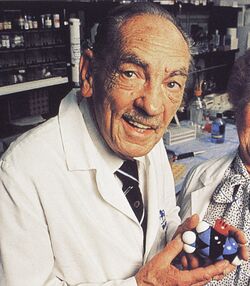Biography:George H. Hitchings
George Hitchings | |
|---|---|
 George H. Hitchings in 1988 | |
| Born | George Herbert Hitchings April 18, 1905 Hoquiam, Washington, U.S. |
| Died | February 27, 1998 (aged 92) Chapel Hill, North Carolina, U.S. |
| Nationality | American |
| Alma mater | University of Washington Harvard University |
| Known for | chemotherapy |
| Awards |
|
| Scientific career | |
| Institutions | |
George Herbert Hitchings (April 18, 1905 – February 27, 1998) was an American medical doctor who shared the 1988 Nobel Prize in Physiology or Medicine with Sir James Black and Gertrude Elion "for their discoveries of important principles for drug treatment", Hitchings specifically for his work on chemotherapy.[2][3][4][5][6]
Education and early life
Hitchings was born in Hoquiam, Washington, in 1905, and grew up there, in Berkeley, California, San Diego, Bellingham, Washington, and Seattle. He graduated from Seattle's Franklin High School, where he was salutatorian, in 1923, and from there went to the University of Washington, from which he graduated with a degree in chemistry cum laude in 1927, after having been elected to Phi Beta Kappa as a junior the year before. That summer, he worked at the university's Puget Sound Biological Station at Friday Harbor on San Juan Island [1], and received a master's degree the next year for his thesis based on that work.
From the University of Washington, Hitchings went to Harvard University as a teaching fellow, ending up at Harvard Medical School. Before getting his Ph.D. in 1933,[7] he joined Alpha Chi Sigma in 1929.[8][9][10]
Career and research
Following his PhD, he worked at Harvard and Case Western Reserve University. In 1942, he went to work for Wellcome Research Laboratories at Tuckahoe, where he began working with Gertrude Elion in 1944. Drugs Hitchings' team worked on included 2,6-diaminopurine (a compound to treat leukemia) and p-chlorophenoxy-2,4-diaminopyrimidine (a folic acid antagonist). According to his Nobel Prize autobiography,
- The line of inquiry we had begun in the 1940s [also] yielded new drug therapies for malaria (pyrimethamine), leukemia (6-mercaptopurine and thioguanine), gout (allopurinol), organ transplantation (azathioprine) and bacterial infections (co-trimoxazole (trimethoprimA)). The new knowledge contributed by our studies pointed the way for investigations that led to major antiviral drugs for herpes infections (acyclovir) and AIDS (zidovudine).[citation needed]
In 1967 Hitchings became vice president in Charge of Research of Burroughs-Wellcome. He became Scientist Emeritus in 1976. He also served as adjunct professor of pharmacology and of experimental medicine from 1970 to 1985 at Duke University.[11]
Hitchings founded the Triangle Community Foundation in 1983. Hitchings is a member of the Medicinal Chemistry Hall of Fame.
Personal life
His first wife, Beverly Reimer Hitchings, died in 1985. Hitchings remarried in 1989 to Joyce Carolyn Shaver-Hitchings, MD. Dr. Shaver-Hitchings died in 2009.[12]
Hitchings died on 27 February 1998 in Chapel Hill, North Carolina.[citation needed]
Awards and honors
Hitchings was awarded the Passano award by the Passano Foundation in 1969,[13] and the de Villiers award in 1970.[14] In 1972, he was awarded the Cameron Prize for Therapeutics of the University of Edinburgh. He was elected a Foreign Member of the Royal Society (ForMemRS) in 1974.[1] In 1989, Hitchings received the Golden Plate Award of the American Academy of Achievement.[15]
References
- ↑ 1.0 1.1 "Fellowship of the Royal Society 1660-2015". London: Royal Society. https://docs.google.com/spreadsheets/d/1RVVZY00MZNrK2YCTTzVrbTFH2t3RxoAZah128gQR-NM/pubhtml.
- ↑ Raju, T N (2000), "The Nobel chronicles. 1988: James Whyte Black, (b 1924), Gertrude Elion (1918–99), and George H Hitchings (1905–98).", The Lancet 355 (9208): 1022, Mar 18, 2000, doi:10.1016/s0140-6736(05)74775-9, PMID 10768469
- ↑ van Zwieten, P A (1988), "[Nobel prize for Medicine 1988]", Nederlands Tijdschrift voor Geneeskunde 132 (53): 2401–2, Dec 31, 1988, PMID 3063980
- ↑ Horgan, J (1988), "Physiology or medicine.", Scientific American 259 (6): 33, Dec 1988, doi:10.1038/scientificamerican1288-33b, PMID 3060998
- ↑ Sjöqvist, F (1988), "[Nobel Prize in medicine: three share this year's Nobel Prize in medicine. Important principles in drug therapy]", Läkartidningen 85 (43): 3542–7, Oct 26, 1988, PMID 2462143
- ↑ Goodwin, Len (1989). "George Hitchings and Gertrude Elion-Nobel Prizewinners". Parasitology Today 5 (2): 33. doi:10.1016/0169-4758(89)90184-1. ISSN 0169-4758. PMID 15463172.
- ↑ Nobel Prize biography
- ↑ Then, R L (1993), "History and future of antimicrobial diaminopyrimidines.", Journal of Chemotherapy (Florence, Italy) 5 (6): 361–8, Dec 1993, PMID 8195827
- ↑ Giner-Sorolla, A (1988), "The excitement of a suspense story, the beauty of a poem: the work of Hitchings and Elion", Trends Pharmacol. Sci. 9 (12): 437–8, Dec 1988, doi:10.1016/0165-6147(88)90133-2, PMID 3078084
- ↑ Medicinal Chemistry Division, American Chemical Society, Medicinal Chemistry Hall of Fame, http://www.acsmedchem.org/hofmain.html, retrieved 30 August 2012
- ↑ Weatherall, Miles (20 March 1998). "Obituary: George Hitchings". The Independent. https://www.independent.co.uk/news/obituaries/obituary-george-hitchings-1151262.html.
- ↑ "Nobel prize winners who contributed to Transplantation - GIN" (in en-US). GIN. 2018-01-27. http://giornaleitalianodinefrologia.it/en/2018/01/27/nobel-prize-winners-who-contributed-to-transplantation/.
- ↑ Talalay, P (1969), "Presentation of Dr. George Herbert Hitchings for the Passano Award.", JAMA 209 (9): 1337–8, Sep 1, 1969, doi:10.1001/jama.209.9.1337, PMID 4895870
- ↑ Dameshek, W (1970), "The deVilliers award of the Leukemia Society of America Inc. to George H. Hitchings, Ph.D.", Bibliotheca Haematologica (36): XXI–XXII, PMID 4950964
- ↑ "Golden Plate Awardees of the American Academy of Achievement". American Academy of Achievement. https://achievement.org/our-history/golden-plate-awards/#science-exploration.
External links
- Miss nobel-id as parameter
 |


